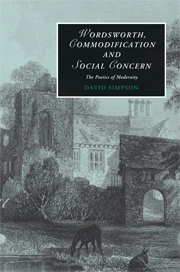Book contents
- Frontmatter
- Contents
- Acknowledgments
- CAMBRIDGE STUDIES IN ROMANTICISM
- Introduction: the ghost and the machine: spectral modernity
- 1 At the limits of sympathy
- 2 At home with homelessness
- 3 Figures in the mist
- 4 Timing modernity: around 1800
- 5 The ghostliness of things
- 6 Living images, still lives
- 7 The scene of reading
- Notes
- Bibliography
- Index
4 - Timing modernity: around 1800
Published online by Cambridge University Press: 15 September 2009
- Frontmatter
- Contents
- Acknowledgments
- CAMBRIDGE STUDIES IN ROMANTICISM
- Introduction: the ghost and the machine: spectral modernity
- 1 At the limits of sympathy
- 2 At home with homelessness
- 3 Figures in the mist
- 4 Timing modernity: around 1800
- 5 The ghostliness of things
- 6 Living images, still lives
- 7 The scene of reading
- Notes
- Bibliography
- Index
Summary
A MULTITUDE OF CAUSES UNKNOWN TO FORMER TIMES
In chapter 1 I explored both the conjunctions and the distinctions between Jeffrey Sachs's recent argument for abolishing poverty and the issues raised in Wordsworth's reported encounter with that starving girl on the roads of France. The conjunctions are to be attributed to an enduring component of modernization that renders the unsolved questions raised by a brilliantly sensitive poet around 1800 still urgent for us today. The distinctions have to do with the poet's commitment to an arresting and haunting personification of the problem of poverty that cannot be boiled down to an unambiguous propositional statement, whether positive or pessimistic. Wordsworth's poetry of social concern remains current because the modern address to poverty and welfare, which Sachs finds to have been indeed inaugurated by the massive economic growth and radical differentiation of wealth around 1800, remains as unsolved now as it was two hundred years ago. Much else has of course changed. Around 1800 there was no Internet, no space shuttle, no knowledge of the DNA model. But the population was on the point of rapidly increasing, the beginnings of modern transport and communications systems were in place (to the extent that Wordsworth could complain about them in terms that we still find familiar), modern mass warfare was occurring for the first time, and the factory economy that would transform the workplace so publicly and profoundly had established itself in Britain, assisted by modern banking and financing institutions.
- Type
- Chapter
- Information
- Wordsworth, Commodification, and Social ConcernThe Poetics of Modernity, pp. 116 - 142Publisher: Cambridge University PressPrint publication year: 2009



